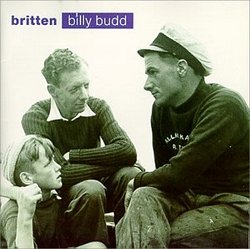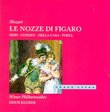| All Artists: Dietrich Fischer-Dieskau, Benjamin Britten, Wandsworth School Boys' Choir, Ambrosian Opera Chorus, London Symphony Orchestra, Peter Pears, Robert Tear, David Bowman, Robert Bowman, Delme Bryn-Jones, Henry Bush, Geoffrey Coleby, Gregory Dempsey, Bryan Drake, Eric Garrett, Peter Glossop, Michael Langdon, Norman Lumsden, James Newby Title: Britten: Holy Sonnets, Billy Budd, etc. / Britten, Glossop, Pears, et al Members Wishing: 2 Total Copies: 0 Label: Decca Import Release Date: 5/9/1989 Album Type: Import Genres: Pop, Classical Styles: Vocal Pop, Opera & Classical Vocal, Historical Periods, Modern, 20th, & 21st Century Number of Discs: 3 SwapaCD Credits: 3 UPC: 028941742827 |
Search - Dietrich Fischer-Dieskau, Benjamin Britten, Wandsworth School Boys' Choir :: Britten: Holy Sonnets, Billy Budd, etc. / Britten, Glossop, Pears, et al
 | Dietrich Fischer-Dieskau, Benjamin Britten, Wandsworth School Boys' Choir Britten: Holy Sonnets, Billy Budd, etc. / Britten, Glossop, Pears, et al Genres: Pop, Classical
|
Larger Image |
CD DetailsSimilar CDs |
CD ReviewsTAKING OUR SALVATION ANY WAY IT COMES DAVID BRYSON | Glossop Derbyshire England | 08/15/2005 (5 out of 5 stars) "The strained economic situation of the classical music industry is working in many ways to our advantage as consumers. Britten's settings of Blake and Donne would never have been issued bundled together with Billy Budd in the vinyl era I'm quite sure. These days if we don't think one follows on from the other we don't have to get out of our armchair to select them as we please, and the composer's accounts of his own songs in partnership with Pears and Fischer-Dieskau would surely be a welcome supplement to more or less any classical cd release. However I imagine the public for this set will consist mostly of enthusiasts for Britten's great masterpiece Billy Budd. This is music-drama, not opera, and the theme of the drama has a certain ambiguity of a kind that Britten was drawn to, as in the unresolved questions left at the end of The Turn of the Screw. The story is adapted by E M Forster and Eric Crozier from Melville. Melville's inspiration in turn was sparked off by the reportage on a court of enquiry into the execution of an ordinary seaman for mutiny. The captain who had so ordered had been advised that the evidence against the seaman was thin. Perceiving nonetheless a need to encourage the others by executing someone, the captain prevailed on the trial officers to take a more forward-leaning view. This they duly did, the captain explained to the man about to be hanged that this was all for the greater glory of the flag, whereupon the man blessed captain and flag. The story of Billy Budd quite obviously had powerful resonance for Forster and Britten. It is a chamber drama basically, for all the background of war at sea between Britain and revolutionary France. There are three main actors - Billy himself, the captain, and the master-at-arms John Claggart. The action, on the face of it, seems small-scale. Claggart conceives a vicious spite against the innocent but adept and personable Billy, strong enough, it seems, for him to try to frame Billy on the capital charge of mutiny. The captain in this case recognises Claggart for the lying ratbag that he is, but goes through the formality of having Billy face his accuser. Rendered inarticulate by his stutter, Billy (whose loyalty to the captain would grace any dog) lashes out with his fist and his one punch kills Claggart. The captain knows the true score perfectly well, but hides behind formal processes again, in the full knowledge that he is thereby condemning an innocent man to death. However just listen to the music accompanying Claggart's first entrance - it would be very overblown just for some spiteful nonentity. Claggart, though unpopular and clearly unpleasant, is not a psychopath, but his hatred of Billy is unprovoked and his scheming is without any motive of personal advantage in an ordinary sense. What it all seems to amount to for Forster and Britten is firstly a parable of some cosmic evil aroused by innocence - the insignificant Claggart is given an Iago-like monologue of enormous and generalised portentousness as well as that sinister introduction from the orchestra. The drama then advances to a near-Faustian level in which the captain seems to stand outside himself and see eternal forces at work, with himself as a pawn in their strategy rather than just a human buck-passer of an all-too-familiar type. It all ends with Billy blessing the captain like the seaman in the original report, and there is an epilogue in which the captain, near the end of his life, reflects on the salvation this blessing brought him. It must be the easiest, or at least the quickest, transition to salvation in all serious drama. A few hours and that was all done and dusted. I can't really imagine that many spectators or listeners will identify with a theme like this, but there is no mistaking the strength of the response it evokes from Britten. Add Forster to that, and maybe to some extent Melville himself, and it is time to suspend scepticism and realise that we are being given a glimpse of a very special, even elite, vision of how deity, or fate or whatever, operates. Most of us probably do not see things this way, but most of us are not Forster or Britten or Melville. As for authenticity in performance, that is self-defined here. The foregoing is one man's interpretation of what this strange and elusive drama might be saying. We can be sure of one thing at least - whatever it all really signifies we are hearing it here. The cast are excellent - this work is a team job, not an opera with star solos, although Billy's final song (in rhyming verse and as truly an aria as anything by Britten's beloved Verdi) is done to what seems to me to be perfection by Peter Glossop. The LSO and the Ambrosian Singers do not let anyone down either, and the 1968 recording still sounds well. Such is the composer's sheer technical skill that it was only after the work had finished that I realised that this whole music-drama contains not one note for a female voice. You may understand the work differently, but you will be hard put to it to experience the power of it more than I have done, whatever it all may mean or imply." A Great Performance By the Composer D. A Wend | Buffalo Grove, IL USA | 12/07/2001 (5 out of 5 stars) "I recently saw a terrific performance of Billy Budd and the sheer excitement of the opera led me to seek out a copy. I read reviews of the available records and came to choose this one. The reason was the dramatic tension that the composer brings to this recording. The sets by Kent Nagano and Richard Hickox are also excellent but I was won over by the fact that this is Benjamin Britten's last word on his opera.The only disadvantage would be that this is a remastered and not a digital recording but the sound is certainly clear and the casting is superb. Peter Glossop is a perfect Billy Budd and brings out the goodness of his character wonderfully. Michael Langdon is a menacing John Claggart and Sir Peter Pears is an able Captain Vere. The entire cast sing their roles with great ability and I think no one would be disappointed in owning this set.Perhaps oddly, two other works by Britten are included: The Holy Sonnets of John Donne and Songs and Proverbs of William Blake, both for piano and voice. In the former work, Britten is joined by Peter Pears and in the latter by Dietrich Fischer-Dieskau. Both works are solemn in character and I doubt that I will play them very often. I am not sure why they were included here unless Decca, who recorded then around the same time, made the decision that they would not sell well on their own. On the other hand, I will be listening to Billy Budd frequently." NOT SO MUCH BILLY BUDD, MORE EDWARD FAIRFAX VERE Klingsor Tristan | Suffolk | 08/31/2006 (5 out of 5 stars) "When you look at all the operatic roles that Britten created for his lifelong partner in life and music (something in every opera except Noye), the first thing that becomes clear is how well he understood Peter Pears' voice and musical talents. The vocal lines fit the voice perfectly, utilising all its strengths and usually avoiding its weaknesses. When you look at the characters he asked Pears to play, however, a rather different picture emerges. As a performer, Pears comes across as rather refined, sophisticated, something of an aesthete, a bit of an intellectual. So, while he makes a good fist of Peter Grimes, it is Grimes the dreamer that tends to stay in the memory: the tough, violent, naïve fisherman is more Jon Vickers territory. The innocent Albert Herring, the impetuous Essex and the impassioned Lysander (though Flute was his original part) really don't work very well as characters with Pears. And, while no-one sings the trance-inducing melismas of Quint quite like him, do we really believe he is the incarnation of corrupting evil? The Male Chorus in Lucretia fares better because he is just an observer with little personality of his own. And Pears' roles in the Church Parables are sufficiently distanced by the Brechtian/Noh ritual of the pieces to allow him to view these characters more objectively.
The two parts that work best for Pears are Aschenbach, the composer's final gift to his lover, and Captain Vere in Billy Budd. Certainly Vere is something of an intellectual and an aesthete: he is a reader of Plutarch, a man somewhat out of touch with the rough sentiments of his subordinate officers, prone to using classical references they don't understand. And he is, like Aschenbach, highly susceptible to the Apollonian appeal of Billy's handsomeness, goodness and beauty (Claggart's words). One suspects that, like Aschenbach again, there is also a more Dionysian aspect to this attraction. Certainly the redemption Vere attributes to Billy's death on that clear, blue morning in enemy waters is not quite as clear and blue and cloudless as he would like to imagine. Captain Vere is one of the most complex of all Britten's characters (at least before Aschenbach). That is, of course, thanks to the subtlety of E.M.Forster's libretto and of Britten's music. But it is also thanks to the force of Pears interpretation. I am inclined to think that this is his best performance in any of the operas on disc. He successfully adumbrates all the different sides of the role - the humanist and the military stickler, the charismatic leader of men and a man torn by internal moral dilemmas and indecisions, an outsider by nature of his rank and his own inclinations who is placed in the closest-knit of male communities. That the part is magnificently sung by Pears goes almost without saying. That he makes the character so fascinating, so complex and so real in the agony of the choices he faces is down to Pears' superlative vocal acting. In this performance it is Vere rather than Billy who is the hero, the focus of the whole opera. Which is not to take away from what is a great team performance of this important opera. Britten never seemed able to cast Billy from the ranks of the Aldeburgh coterie - Theodor Uppman, the Billy at the premiere, was an American import; Peter Glossop on this recording, a North Country Verdi specialist. He sings the part well enough, is touching in Billy in the Darbies, but can be a little unimaginative. Claggart is in the hands of the underrated and under-recorded Michael Langdon (a great Ochs in his time), as black of voice and soul as any Wagnerian villain. The quarter-deck officers are a fine set of Britten regulars: the lower-decks boast some fine newcomers to those ranks in the likes of Robert Tear and Benjamin Luxon as the Novice and his Friend. The chorus are magnificent, whether in the drudgery of daily chores, the relaxation of shanty-singing or the excitement of battle. Britten, as you would expect, conducts his own music with a naturalness and a perception that allows detail to make its points without ever losing sight of the overall structure (all to do with two fiercely opposed key-centres, set out in the Prologue and only finding their eventual resolution in the Epilogue). The two fill-ups on Disc 1 add to the value of the set if not seeming strictly relevant to the opera they accompany - the Metamorphoses for Oboe would have done that better. Nevertheless the Donne Sonnets from the end of the War and the Blake Songs and Proverbs from the 60's get definitive performances from Pears and Fischer-Dieskau respectively, both with the composer at the piano. " |

 Track Listings (22) - Disc #1
Track Listings (22) - Disc #1



